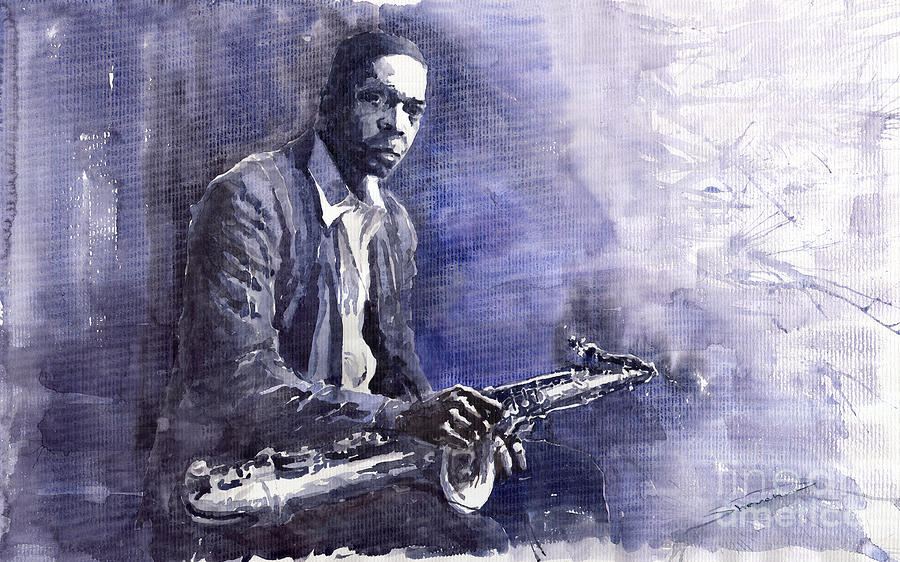Top 5 John Coltrane Albums
- A Love Supreme
A Love Supreme, an opus of spiritual and musical transcendence, is a highly revered and seminal album in the annals of jazz music. Released in 1965, the album was the brainchild of the virtuosic saxophonist and composer, John Coltrane. The album is a four-part suite that is steeped in the spiritual and philosophical musings of Coltrane, and it is widely considered to be one of the most significant and enduring statements in the genre of jazz.

The album commences with the introductory track, "Acknowledgement", which serves as a prelude to the subsequent three parts of the suite. This track is replete with Coltrane's signature dissonant harmonies, and it sets the tone for the spiritual and introspective nature of the album. The second part of the suite, "Resolution", is a tour de force of virtuosic improvisation, showcasing Coltrane's technical prowess on the saxophone. The third part, "Pursuance", is a meditative and contemplative piece that features the interaction between the saxophonist and the rhythm section. The final part, "Psalm", is a cathartic and uplifting conclusion to the suite, with Coltrane's saxophone soaring over the propulsive and driving rhythm section.
The album's spiritual themes are inspired by Coltrane's deep interest in mysticism and religion, and they are reflected in the album's title and the lyrics of the final part of the suite. The title, A Love Supreme, is a reference to Coltrane's deep reverence for God, and the lyrics of the final part, "Psalm", are a hymn of thanksgiving and praise to God. The album serves as a testament to Coltrane's spiritual and musical journey, and it is a masterful expression of the musician's artistic vision.
Musically, A Love Supreme is a tour de force of virtuosity and innovation. Coltrane's saxophone playing is characterized by its intense and emotional expressiveness, and his solos are replete with complex harmonies, virtuosic runs, and virtuosic technique. The rhythm section, consisting of pianist McCoy Tyner, bassist Jimmy Garrison, and drummer Elvin Jones, is equally impressive, with each musician contributing to the overall dynamic and cohesive sound of the album.
A Love Supreme is a seminal work of jazz music that continues to be celebrated and revered by jazz enthusiasts and musicians alike. Its enduring legacy is a testament to the enduring power of Coltrane's artistic vision and his ability to create music that is both intellectually stimulating and emotionally resonant. It is a veritable magnum opus that stands as a pinnacle of the jazz idiom and as a testament to the transcendent nature of art.
- Giant Steps
Giant Steps, released in 1960, is a seminal album in the annals of jazz music and a quintessential statement of John Coltrane's artistic vision and virtuosity. The album is widely considered to be a major turning point in the development of modern jazz, and it is renowned for its challenging harmonic structures and Coltrane's virtuosic saxophone playing.
The album commences with the title track, "Giant Steps", which sets the tone for the album's virtuosic and harmonically complex nature. The tune features Coltrane's signature dissonant harmonies, and his virtuosic runs and rapid-fire lines that showcase his technical prowess on the saxophone. The tune "Naima" is a beautiful and contemplative ballad that is characterized by Coltrane's melodic and emotionally expressive playing. "Cousin Mary" is a hard-driving and dynamic tune that showcases the interplay between Coltrane and the rhythm section, consisting of pianist Tommy Flanagan, bassist Paul Chambers, and drummer Art Taylor.
Coltrane's compositions on the album are steeped in the harmonic language of bebop and feature complex chord progressions that were considered challenging for the musicians of the time. Coltrane's approach to harmony on the album was a departure from the traditional bebop vocabulary and it was an important step in the development of the harmonic language of jazz and the modal jazz. If you are ever interested in learning piano you should check out our piano lessons in Ann Arbor.
Coltrane's virtuosic and expressive saxophone playing is a highlight of the album. His solos are characterized by their intense and emotional expressiveness, and his virtuosic runs and complex harmonies are a testament to his technical prowess and artistic vision. The rhythm section, consisting of Flanagan, Chambers, and Taylor, is equally impressive, with each musician contributing to the overall dynamic and cohesive sound of the album.
Giant Steps is a seminal work of jazz music that continues to be celebrated and revered by jazz enthusiasts and musicians alike. Its enduring legacy is a testament to the enduring power of Coltrane's artistic vision and his ability to create music that is both intellectually stimulating and emotionally resonant. The album's challenging harmonic structures and virtuosic performances were ahead of their time and continues to be an inspiration for jazz musicians.
- Ballads
"Ballads" is a jazz album by saxophonist John Coltrane, released in 1963. The album features a collection of ballads and standards, showcasing Coltrane's emotive and melodic playing style. Despite the album's title, it also includes uptempo and hard bop numbers such as "All or Nothing at All".
The album opens with the iconic and melancholic "Say It (Over and Over Again)", a tune that highlights Coltrane's ability to convey deep emotions through his playing. The following track, "You Don't Know What Love Is" is a melancholic and introspective ballad that showcases Coltrane's technical prowess on the saxophone. The album also features Coltrane's interpretation of the classic tune "I'm Old Fashioned", a tune that highlights Coltrane's melodic and harmonic approach to jazz standards.
The album also features Coltrane's quartet, consisting of pianist McCoy Tyner, bassist Jimmy Garrison, and drummer Elvin Jones. They provide a solid and cohesive backing for Coltrane's emotive playing, and their interaction and interplay add to the dynamic and nuanced nature of the album.
One of the notable aspects of "Ballads" is the contrast between Coltrane's virtuosic and intense improvisations and the album's mostly slow-tempo, melancholy and introspective tunes. Coltrane's playing on the album is characterized by its emotive and melodic expressiveness, as well as his use of dissonant harmonies and dissonant notes, which adds to the introspective and melancholic mood of the album.
The album received positive reviews from critics and it is considered one of Coltrane's most introspective and personal recordings. It is a testament to Coltrane's artistic vision and his ability to convey deep emotions through his playing. The album's melancholic and introspective ballads, as well as the uptempo and hard bop numbers, showcase Coltrane's versatility and range as a musician.
- My Favorite Things
"My Favorite Things" is a seminal album in the annals of jazz music, released in 1960 by saxophonist John Coltrane. The album is renowned for its virtuosic and exploratory performances, and for its innovative approach to harmony and form. The title track, "My Favorite Things", is a reinterpretation of the song from the musical "The Sound of Music", and it serves as the centerpiece of the album.
The title track commences with a brisk and lively theme, played by the ensemble, and Coltrane's saxophone enters with a virtuosic and exploratory solo that sets the tone for the album's virtuosic and exploratory nature. The tune is characterized by its complex and dissonant harmonies, and Coltrane's solos are replete with virtuosic runs, rapid-fire lines, and complex harmonies. The tune "Summertime" is a beautiful and contemplative ballad that highlights Coltrane's melodic and emotionally expressive playing. "But Not for Me" is a hard-driving and dynamic tune that showcases the interplay between Coltrane and the rhythm section, consisting of pianist Wynton Kelly, bassist Paul Chambers, and drummer Jimmy Cobb.
Coltrane's approach to harmony on the album was a departure from the traditional bebop vocabulary and it was an important step in the development of modal jazz, which became prominent in the 60s. Coltrane's virtuosic and exploratory performances on the album were ahead of their time and continue to be an inspiration for jazz musicians.
Coltrane's virtuosic and expressive saxophone playing is a highlight of the album. His solos are characterized by their intense and emotional expressiveness, and his virtuosic runs and complex harmonies are a testament to his technical prowess and artistic vision. The rhythm section, consisting of Kelly, Chambers, and Cobb, is equally impressive, with each musician contributing to the overall dynamic and cohesive sound of the album.
"My Favorite Things" is a seminal work of jazz music that continues to be celebrated and revered by jazz enthusiasts and musicians alike. Its enduring legacy is a testament to the enduring power of Coltrane's artistic vision and his ability to create music that is both intellectually stimulating and emotionally resonant. The album's innovative approach to harmony and form, as well as Coltrane's virtuosic and exploratory performances, were ahead of their time and continue to be an inspiration for jazz musicians.
- Afro Blue Impressions
"Afro Blue Impressions" is a live album by saxophonist John Coltrane, recorded in 1963 and released posthumously in 1977. The album features Coltrane's quartet, consisting of pianist McCoy Tyner, bassist Jimmy Garrison, and drummer Elvin Jones, performing live at Konserthuset in Stockholm and Auditorium Maximum in Berlin. The album is notable for its extended and virtuosic improvisations, and for its focus on African rhythms and melodies.
The album opens with the title track, "Afro Blue" which is a reinterpretation of Mongo Santamaria's composition. This version features Coltrane's quartet playing the piece in a different tempo and with an improvisational approach, it showcases Coltrane's virtuosic and exploratory playing style and his ability to take a tune and make it his own. The album also features the tune "Cousin Mary" which is a hard-driving and dynamic tune that showcases the interplay between Coltrane and the rhythm section.
The album is notable for its focus on African rhythms and melodies, a topic that Coltrane was deeply interested in. Coltrane's performances on the album are characterized by their intense and emotional expressiveness, and his virtuosic runs and complex harmonies are a testament to his technical prowess and artistic vision. The rhythm section, consisting of Tyner, Garrison and Jones, is equally impressive, with each musician contributing to the overall dynamic and cohesive sound of the album.
"Afro Blue Impressions" is a live album that highlights the virtuosity and improvisational skills of John Coltrane and his quartet. The album's extended improvisations, focus on African rhythms and melodies, and the interplay between the band members make it a valuable document of Coltrane's music and a must-listen for jazz enthusiasts and musicians. It is also a great representation of Coltrane's interest in African American Music and its influence on his work.
I hope you will check out each one of these albums, they are all incredible. There's almost a lifetime worth of musical information in them. John Coltrane was so incredible, it's unreal. Thank you for check out my list and reading this article all the way to the end! :)



